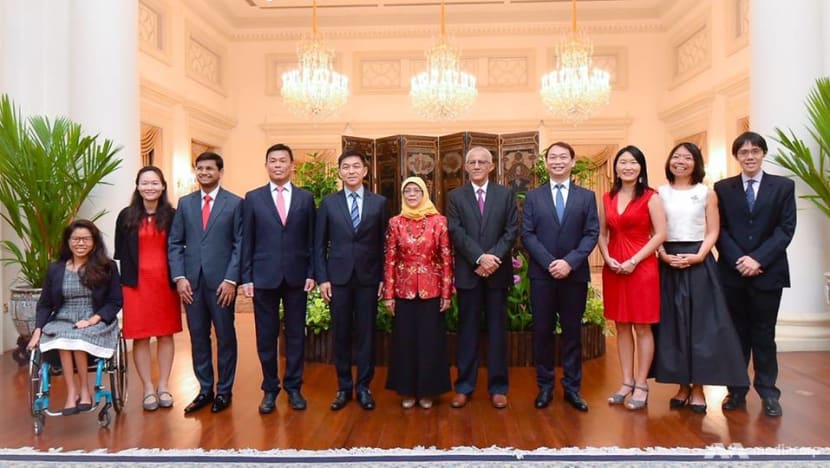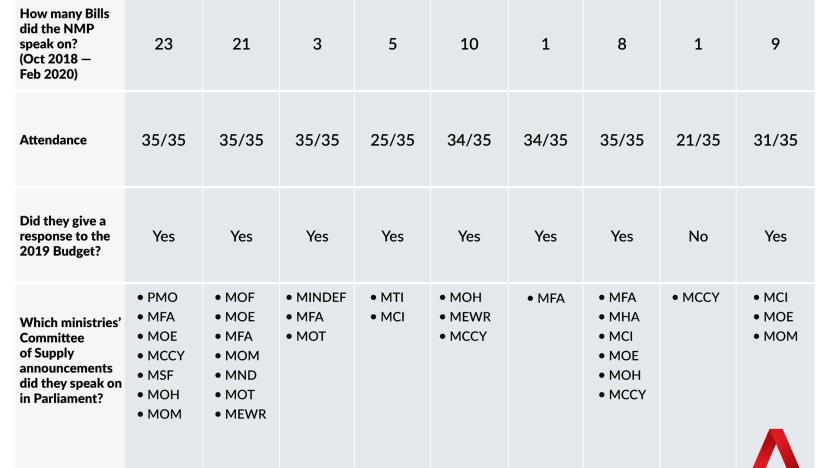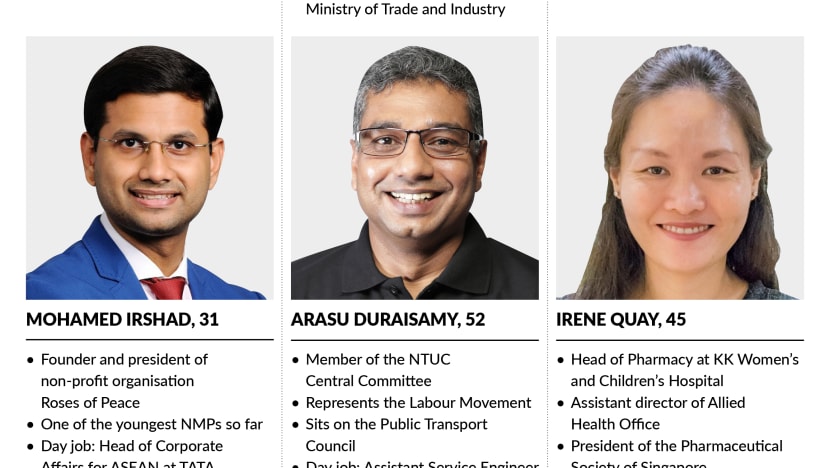For Nominated Members of Parliament, it's not just about talking in Parliament

President Halimah Yacob with the new NMPs who were officially appointed on Wednesday (Sep 26). (Photo: Jeremy Long)
SINGAPORE: In the parliamentary sitting on Feb 3 and 4, Nominated Members of Parliament (NMP) Anthea Ong and Walter Theseira once again raised their views on a wide range of issues, from the local impact of COVID-19 to the e-scooter footpath ban that was implemented overnight in 2019.
The social entrepreneur and labour economist have become mainstays on the podium since they were appointed officially on Sep 26, 2018 as part of the 14th batch of nine NMPs.
Among their peers, Ms Ong and Associate Professor Theseira have spoken the most number of times on bills and filed the most number of parliamentary questions (PQs).
They have responded to more than twice the number of bills compared to the others, and filed at least four times more the number of PQs than the rest.
Here is a tally of the NMPs appearances and speeches in Parliament since October 2018.

SERVING IS A PRIVILEGE, SAY NMPS
“I don’t know if I know how to be half-hearted or lukewarm with things I’ve decided to say yes to,” Ms Ong said.
She has spoken up at every sitting and filed the most number of PQs - 92 - among the NMPs.
She said she owes it to the realisation that the “hallowed chambers” where laws are made and announced affects even the most ordinary person’s life.
Similarly, when asked whether he makes it a point to speak up often, Assoc Prof Theseira was quick to note that parliamentary time “is actually very expensive” and that he only speaks when he thinks he can contribute.
“But I’ve also found that because of the nature of my work, as well as the nature of people who have connected to me because of this position, there just happened to be quite a lot of bills that I could speak on,” the labour economist, who has spoken on 21 bills - the second-most among the NMPs - said.
His research areas of applied microeconomics, as well as public and labour economics are often relevant to issues that come up in Parliament, he added.
“I don’t feel as if I have to open my mouth every single time, but I also have found that many of the bills (that come up) are issues that either I feel strongly about or they are issues which I feel I could contribute something on, and that’s why I’ve spoken on them.”
Dr Felix Tan, associate lecturer at the Singapore Institute of Management Global Education (SIM GE), said “meaningful contributions” have come from Assoc Prof Theseira and Ms Ong, noting that they have both spoken on issues such as youth advocacy and the standard of a more liberal education in Singapore.
“Although there has been little change in the government response and attitude towards any meaningful changes in that aspects, it has definitely brought something valuable to the table that may, or may not, be discussed in the future,” said Dr Tan.
However, he also questioned how an NMP’s performance is measured since they are not elected representatives.
“The views of these NMPs have been non-partisan and have rarely crossed the line when it comes to some more heated debates that have engulfed parliamentary sessions,” said Dr Tan.
“However, there are also some of the NMPs that have been rather quiet and have not always necessarily contributed much to the overall discussions on policy matters and one wonders what difference has their presence made in tweaking policies and/or providing for an alternative voice in Parliament.”
BEING AN NMP IS NOT JUST ABOUT TALKING IN PARLIAMENT
Mohamed Irshad, a NMP representing the religious and youth communities, has attended every sitting, but there are months when he does not speak in Parliament, such as in April and September 2019. It should not be taken as a sign that he treats his role lightly, he said.
“You can’t just speak on a bill just because it’s being debated,” the founder of inter-faith group Roses of Peace said. “You have to see what’s the value and the contribution you are bringing to the conversation (based on) my pet areas.”
Mr Irshad gave some examples of bills he felt he added value to during the debates. Between October 2018 and February 2020, he spoke on eight of them.
The Gas Act, which was passed during his first month in Parliament, is one. He felt that he needed to ask some questions on it as the topic is very much linked to Singapore's sovereignty, given that the country imports gas from Malaysia and Indonesia.
"I felt as a young Singaporean, that this is an issue that should be raised, because it directly impacts the survival of Singapore, which is going to impact the future generations," he said.
As for filing parliamentary questions, he explained that unless there is going to be a “tangible output”, he would refrain from filing questions for which parliamentarians can get information directly from a ministry outside of Parliament. He can always raise supplementary questions or clarify with a minister on a particular issue separately.
In his case, a "tangible output" would mean highlighting issues that have a national impact, is of public interest or surfaces people's concerns. For instance, representatives from religious or youth communities have in the past came to him with the hopes of getting a problem heard or fixed.

His appointment extends beyond parliamentary sittings, he said. The NMP post has given him a platform to interact with politicians candidly and tell them the problems on the ground, while explaining to members of the public, including religious leaders, what the challenges are when it comes to crafting policy.
National para-swimmer Yip Pin Xiu and executive director of the Singapore Chinese Orchestra Terence Ho agreed.
The paralympian believes she has championed para-sport in Parliament as an NMP, both by raising issues from the circle in parliament, and through her efforts to connect sport organisations - particularly the Singapore Disability Sports Council and specific sport associations - to develop a more inclusive sports scene.
“It gives me legitimacy to do so,” she said.
Mr Ho stressed that the NMPs are not measured by the number of speeches or parliamentary questions they submit.
“I think it’s very much outcome-driven. I like to work with an end-to-end model, you also need to engage the agency, you also need to engage the ministry,” he added.
“If you’re going to speak up on something which is not relevant or in the pipeline or agenda, I feel that that’s wasting your own research time and Parliament time.”
READ: Paralympian Yip Pin Xiu, Sakae Holdings chairman Douglas Foo among 9 new proposed NMPs
READ: Plans for Parliament: NMP candidates share motivations to be in politics
Mr Douglas Foo, founder and CEO of Sakae Holdings and vice chairman of the Singapore Business Federation, noted that aside from speaking up in Parliament, NMPs also take on other roles in committees and workgroups behind the scenes.
“If you realise, I don’t pick a lot of bills to speak on because I think there’s already not a lot of time (in Parliament). And so (only when) I really have something that I want to put on the table, then I will choose that particular bill to talk about,” he said.
Mr Foo was part of the tripartite workgroup working up to the recommendations for low-wage workers announced late last year. He shared that he had taken part in about 15 months of discussions with the enterprises, workforce, unions and government agencies on the matter.
“I also serve in quite many areas in terms of the various ministries, so sometimes you don’t have to be necessarily able to put it through Parliament, but just actually hearing some of the views and thoughts that other subcommittees and working groups (have), actually you could put those essential points across.”
PET CAUSES
The NMPs are chosen to represent at least one of seven ‘functional groups’, or areas of society: business and industry, the professions, the labour movement, social and community organisations, media, arts and sports, tertiary education institutions, and civil society.
Notably, Ms Ong, who said that she advocates for civil society, often brings up mental health and climate change issues. This is no accident, she said, noting that she has brought up either issue in every bill she has spoken on.
“Mental health and climate change are so invisible they are often pushed to the ‘important but not urgent quadrant,” she explained.
And for mental health, there is a second reason: “Bringing it up at this level of society would be a big, big way of destigmatising mental health (conditions).”
“Shame goes away, things get done, policies are being developed, designed, changed. And budget is being allocated to this.”
Being persistent does bear fruit, Ms Ong attested. She said she has been engaging the Ministry of Health on mental health issues for the upcoming Budget.
And in April last year, education minister Ong Ye Kung asked if she would like to meet privately and discuss mental health education, which has led to ongoing dialogues with the ministry’s senior management.
READ: Public service committed to provide 'inclusive and mental health-friendly' workplace: Chan Chun Sing
As for Assoc Prof Theseira, aside from education and economics, he also often files parliamentary questions about LGBTQ issues.
Stressing that he does not have pet causes, he explained that he often speaks up on the topic because he felt it was important that LGBTQ individuals and issues are represented in Parliament.
“In terms of the numbers we don’t really know how many (LGBTQ people there are), but I wouldn’t be surprised if (the number) was equivalent to some of our minority groups,” he said, adding that he receives hundreds of emails from members of the public each time he speaks on the topic.
“And the fact that in our political system, nobody who’s elected would feel comfortable bringing up those issues, I think it’s a problem for representation.”
As for fellow academic and educator Professor Lim Sun Sun who heads the Humanities, Arts and Social Sciences school at the Singapore University of Technology and Design, being an NMP has allowed her to speak on issues she champions, like media literacy, the rights of children, and the protection of individuals on digital platforms.
“When I entered the position I felt that it would mean basically having a larger classroom and a very interesting position from which to share academic insights in a way that was productive and constructive to policy-making,” said Prof Lim, who spoke on the Protection from Harassment Act.
“It’s been interesting because (when) you say these things in Parliament, versus if you just write it in a journal article, the impact is definitely greater and it also opens the doors to deeper conversations with policymakers as well as municipal leaders.”
VALUE IN NMP SYSTEM
The NMP scheme came into effect in September 1990 to introduce more diverse and non-partisan views in Parliament.
In July 1997, the maximum number of NMPs was increased from six to nine, and their term raised from two years to two-and-a-half years in August 2002.
Despite the NMPs’ confidence in their work in Parliament, the NMP system has had its fair share of criticism.
For one, the NMPs are chosen by an eight-member special select committee, in which the latest batch - like the previous - was made up of seven members from the ruling People’s Action Party and only one from the opposition Worker’s Party.
Political observers have said in the past that the discussion and votes among the committee members should be recorded and made public, so that people can examine how and why the NMPs were selected.
The concept of having NMPs represent the functional groups has led to the political analysts questioning whether the system confines the NMPs to speaking only on behalf of the interest group that nominated them, while keeping silent on issues outside their domain.
Another view, said SIM GE’s Dr Tan, is that the NMPs cannot speak on behalf of Singaporeans because they do not represent any constituencies.
But he noted multiple occasions where NMPs, both past and present, have raised “important issues facing society that needed to be addressed”.
For example, Ms Eunice Olsen, who was an NMP between 2004 to 2009, made contributions to women’s issues and pushed for a more open discussion on a topic that mattered to an important segment of society, added Dr Tan.
“By and large, the NMP scheme has been useful and has brought the debates to a higher level of substance. It has a neutrality that is sometimes needed in the midst of a very touchy and controversial policy discussion,” he said.
And while what NMPs present in parliament may not translate to an immediate change in policy, said Mr Irshad, their speeches and questions can be used to “set off conversations...have policymakers look into the issues (and be used as a) point of reference for future parliamentarians.”
"I don’t have lofty delusions around the impact that we have. Ultimately a lot of people don’t know who the NMPs are, they may not even know such a scheme exists," said Prof Lim
"But if in my own small way, I can use this provision to raise awareness on some issues, then I will make the most of it."
















